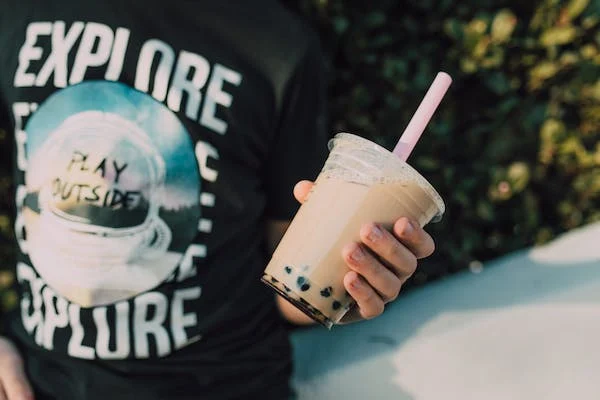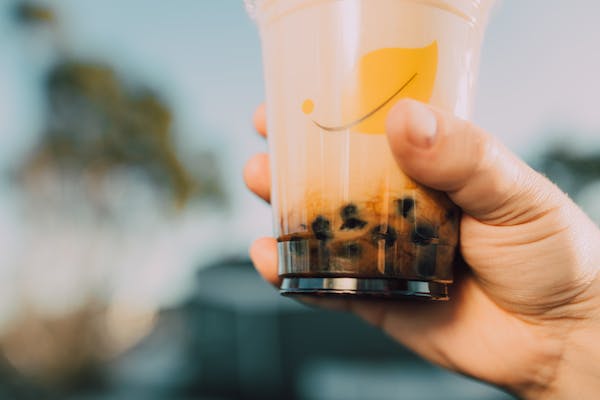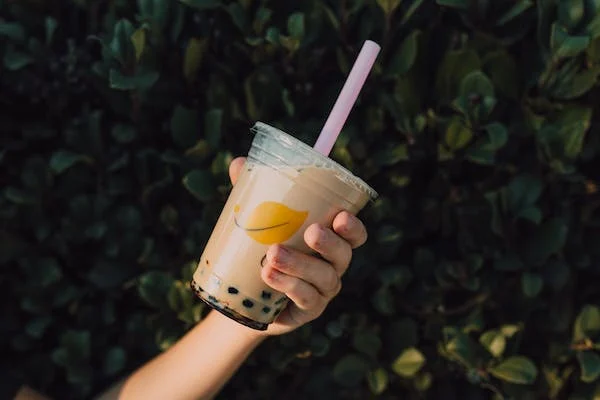Are you a fan of flavor-packed beverages? Thai tea has been growing in popularity in recent years, and those who are fans of the sweet aroma and delicious taste may be pleased to find out that it also offers some potential benefits. But for the health conscious consumer interested in reducing their caffeine intake, this may raise the question: Does thai tea have caffeine? In this blog post we will explore what makes up a cup of traditional thai tea, how much caffeine is present, and discuss some potential alternatives if you’re looking to reduce your consumption.
What is thai tea?
Thai tea is a popular beverage that has its origins in Thailand, where it is known as Cha Yen. It is a blend of black tea, spices, and sweetened condensed milk that results in a creamy and aromatic drink with a striking orange hue. The tea’s unique flavor profile is attributed to the blend of spices, which usually includes star anise, cinnamon, cardamom, and cloves.

What is caffeine?
Caffeine is a naturally occurring stimulant that belongs to a group of compounds known as xanthines. It is commonly found in various plant species, most notably in coffee, tea, cocoa, and kola nuts. Caffeine has a chemical structure similar to adenosine (a neurotransmitter), and when consumed, it binds to the adenosine receptors in the brain, thus blocking the adenosine molecules from indicating fatigue to the nervous system.
Importance of knowing does thai tea have caffeine
For those who are health conscious or caffeine-sensitive, it’s crucial to understand the caffeine content of beverages before consuming them. Caffeine consumption has been linked to a range of potential side effects, including insomnia, nervousness, and an increased heart rate. Furthermore, excessive caffeine intake has been associated with chronic health problems such as high blood pressure, heart disease, and osteoporosis.
Does thai tea have caffeine?
If you’re wondering whether thai tea contains caffeine, the answer is generally yes. The black tea used as the base for thai tea naturally contains caffeine, which means that the finished beverage will also contain it.

Where does the caffeine in thai tea come from?
The caffeine in thai tea comes from the black tea used to make it. Depending on the type of black tea used, caffeine levels can vary greatly. Generally speaking, a cup of thai tea contains anywhere between 30 and 80 mg of caffeine.
How much caffeine is in thai tea?
If you’re curious about the amount of caffeine in a cup of thai tea, it’s essential to note that the answer can vary depending on specific factors. The black tea leaves used as the base for thai tea naturally contain caffeine, which means that the final beverage will also have some caffeine content. Generally speaking, a typical cup of thai tea will contain around 20-60 milligrams of caffeine.
Is there a lot of caffeine in thai tea?
When it comes to caffeine content, the amount in a cup of thai tea falls within the moderate range. While it may not have as much caffeine as a cup of coffee, it still contains enough to have a stimulating effect on the body. The amount of caffeine present can vary depending on factors like the type of tea leaves used, the brewing method, and the serving size. As a general rule, an average cup of thai tea contains around 20-60 milligrams of caffeine, which is less than half the amount present in a typical cup of coffee. However, for those who are caffeine-sensitive or trying to cut back on their caffeine intake, even this amount may be too much. In such cases, it may be advisable to opt for decaffeinated thai tea or to explore other herbal tea options that do not contain caffeine.
Caffeine in thai tea compared to other types of tea
When it comes to caffeine content, thai tea falls in the moderate range in comparison to other types of tea. Black tea, the base ingredient used to make thai tea, naturally contains caffeine, resulting in an average of 20-60 milligrams of caffeine per cup. However, other types of tea, such as green tea and white tea, generally contain less caffeine than black tea. Green tea contains an average of 35 milligrams of caffeine per cup, while white tea contains around 30 milligrams per cup. Herbal teas, which do not contain any true tea leaves, are caffeine-free and offer a suitable alternative for those looking to reduce their caffeine intake. It’s worth noting that the exact amount of caffeine present in any particular cup of tea can vary depending on various factors, such as the brewing method and serving size. Therefore, it’s always a good idea for those who are sensitive to caffeine to consult with their healthcare provider regarding their recommended daily caffeine intake and make informed choices about their beverage selections.
Factors affecting caffeine in thai tea
The amount of caffeine in a cup of thai tea can be affected by the type of black tea used, as well as the brewing time and water temperature. Generally speaking, longer brewing times will result in higher caffeine levels, and hotter water temperatures will also increase the amount of caffeine extracted from the tea leaves. Additionally, certain types of black teas may have higher levels of caffeine than others, so it’s important to be aware of which type you are using.
How to reduce caffeine in thai tea?
If you’re looking to reduce your caffeine intake from thai tea, there are a few strategies that you can use. First, choose a lower-caffeine black tea for brewing, such as green or oolong tea. Additionally, try reducing the brewing time and/or using cooler water temperatures to minimize the amount of caffeine extracted from the tea leaves. Finally, you could opt for a decaffeinated version of thai tea, which is available in some specialty stores.
What is thai tea used for?
Thai tea is primarily consumed for its unique flavor profile and refreshing properties. The blend of black tea, sweet condensed milk, and spices creates a creamy and aromatic drink with a striking orange hue. In Thailand, where it originated, it is a popular beverage served throughout the day and often enjoyed as an after-dinner treat. Furthermore, the various spices used in the blend have been known to offer some potential health benefits. For example, star anise is a natural anti-inflammatory, cinnamon may help with blood sugar regulation, cardamom is known for its digestive properties, and cloves have antibacterial and anti-inflammatory properties. However, it’s important to note that these benefits may vary depending on how the tea is brewed and the specific spices used. Overall, thai tea is a delicious and refreshing beverage that can be enjoyed as a treat, but it’s essential to be mindful of its caffeine content and potential side effects, particularly for those who are sensitive to caffeine or pregnant.
How to make thai tea at home?
Making thai tea at home is an easy and fun way to enjoy the delicious flavor of this beverage. To make it, you will need black tea leaves, star anise, cinnamon, cardamom, cloves, sweetened condensed milk, and water. Start by boiling some water in a pot and adding the spices and tea leaves. Bring the mixture to a boil and let it steep for 5-10 minutes before straining out the spices and leaves. Finally, add sweetened condensed milk to taste, and enjoy your homemade thai tea! Adding a few ice cubes will make it even more refreshing.
Tips to enjoy thai tea perfectly and safely
To ensure that you enjoy your thai tea safely and perfectly, there are a few tips to keep in mind. First, make sure the water is brought to a rolling boil before adding the spices and leaves. This will help bring out the flavor of the tea and give it its signature orange hue. Secondly, be careful not to steep for too long as this could result in a bitter cup of tea. Finally, be sure to use sweetened condensed milk or other non-dairy milk alternatives if you are vegan or lactose intolerant. With these tips, you’ll be sure to enjoy the perfect cup of thai tea every time.
Other variations of thai tea
Other variations of thai tea are also popular and offer unique flavor profiles and potential health benefits does thai tea have caffeine. One such variation is the addition of boba, which are chewy tapioca balls that are typically found in bubble tea. Boba thai tea is a popular trend that originated in Taiwan and has since made its way to the United States. The addition of boba adds a fun and playful texture to the beverage, and the tapioca balls are often soaked in a simple syrup, adding sweetness to the drink. While boba thai tea does contain caffeine from the black tea base and potential added flavors like matcha, taro, or mocha, the exact amount can vary depending on the serving size and brewing method.

Conclusion: Does thai tea have caffeine
In conclusion, thai tea is a popular beverage that originates from Thailand and is known for its unique flavor profile and striking orange hue. It is made by blending black tea, sweetened condensed milk, and spices like star anise, cinnamon, cardamom, and cloves. While delicious and refreshing, it’s crucial to note that thai tea contains caffeine, with an average of 20-60 milligrams per cup, which can have potential side effects for those who are caffeine-sensitive or looking to reduce their intake.
FAQ: thai tea
Does thai tea have more caffeine than coffee?
No, thai tea generally contains less caffeine than coffee. While the exact amount of caffeine in any given cup of thai tea can vary depending on factors like the brewing method, the average cup of thai tea will contain around 20-60 milligrams of caffeine. This is less than half the amount present in a typical cup of coffee, which typically ranges from 95-200 milligrams of caffeine per serving. It’s important to note, however, that the caffeine content in both beverages can vary depending on specific factors like the type of coffee or tea used, the brewing method, and the serving size. Therefore, those who are sensitive to caffeine or looking to limit their caffeine intake may want to consider opting for a decaffeinated beverage or exploring other herbal tea options that are naturally caffeine-free.
Can i drink thai tea while pregnant?
Black tea, including Thai tea, is safe to drink during pregnancy as long as it is consumed in moderate amounts. To ensure a healthy intake of caffeine, limit your daily consumption to one or two cups. It is important to be mindful of the unknown caffeine levels in black tea, which is why pregnant women often have concerns about consuming it.
Does thai tea boba have caffeine?
Thai tea: a refreshing and invigorating beverage packed with energy. Made from black tea, known for its caffeine content, and a touch of added sugars. Experience a boost that keeps you awake and energized.
Does thai tea keep you awake?
Thai tea: the perfect energizing drink. Made with black tea and added sugars, this delightful beverage is sure to keep you awake and energized.
How long does thai tea last in the fridge?
Prepare ahead and store Thai tea in the fridge for up to 4 days. Simply add condensed milk and evaporated milk when ready to enjoy. Beware: Thai tea mix stains severely. Act swiftly if any spills occur.
Is there caffeine free Thai tea?
Although traditional Thai tea is made from black tea and therefore typically contains caffeine, there are several caffeine-free options available. Certain herbal or fruit-based versions do not include any actual tea leaves and are naturally free from caffeine. Furthermore, certain producers provide decaffeinated Thai tea choices that are processed without chemicals. These options are ideal for individuals seeking to avoid or reduce their caffeine consumption while still relishing the distinct taste of Thai tea.
Does Thai tea latte have coffee in it?
While this isn’t exactly a coffee recipe, those seeking an extra kick can add a shot of espresso. Nevertheless, this rich and bold Thai Tea Latte boasts ample caffeine on its own. Although quite sweet, it’s truly a delectable indulgence best saved for occasional enjoyment.
Is Thai tea strong?
Indulge in the delightful flavors and aroma of Thai tea, a popular beverage savored across the globe. Crafting this creamy, divine drink involves brewing black tea leaves combined with a medley of spices and sweetened condensed milk, offering a vivid orange hue. Satisfy your taste buds with this aromatic and luscious concoction.
Will Thai tea keep me awake?
Although at a moderate level, Thai tea contains caffeine due to the black tea leaves used as its base. The caffeine content in a cup of Thai tea, ranging from 20-60 milligrams, may vary depending on the brewing method. Though it’s not as much as coffee, this amount still has a stimulatory effect on the body.
Are Thai teas healthy?
Research reveals that consuming black tea on a regular basis, particularly Thai tea, can effectively alleviate several health concerns such as inflammation, heart disorders, and obesity.
Does matcha or Thai tea have more caffeine?
When it comes to caffeine in tea, the variety and brewing methods make all the difference. In general, green, white, black, and oolong teas tend to have lower caffeine content as compared to Thai iced tea, matcha, or yerba mate.
Why is Thai tea so sweet?
Discover the tantalizing taste of Thai tea – a unique blend that’s sweeter and creamier than regular tea, thanks to its infusion of sugar and condensed milk. With a cool, refreshing mouthfeel and warm hints of spice, it’s the perfect balance of flavors to satisfy your taste buds. Made from a variety of black tea, Thai tea is bursting with rich, dominant flavor that’s sure to delight. Indulge in this unforgettable beverage today.
Can I drink Thai tea while pregnant?
Stay energized and healthy while you’re pregnant with Thai tea! It’s a black tea safe for consumption as long as you indulge in moderation. To maintain a safe amount of caffeine intake, limit yourself to one or two cups a day. As the caffeine content can vary, it’s best to play it safe.
Does jasmine Thai tea have caffeine?
Thai tea usually contains caffeine, which varies depending on the brand and type. Nevertheless, the caffeine quantity can vary considerably among beverages. Certain brands also offer unique blends that have less caffeine than others.
What is Thai tea made of?
Discover the unmistakable taste of Thai tea – a classic Southeast Asian drink made from Ceylon black tea, combined with milk, sugar, and a delightful blend of spices, including cardamom and star anise. This refreshing treat can be enjoyed hot or cold, making it perfect for any occasion. Uncover the authentic flavors of Thailand in every sip, available at your favorite Thai food establishments.
